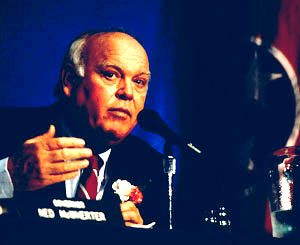
Ned Ray McWherter
Ned Ray McWherter, governor and Speaker of the Tennessee House, was born in Palmersville, Weakley County, to Harmon Ray and Lucille Golden Smith McWherter in 1930. Educated in the public schools of Dresden, the seat of Weakley County, McWherter joined the Tennessee National Guard in 1948 and served until 1969, when he retired with the rank of captain. As a young man, McWherter owned and operated several local businesses while also managing a family farm. In 1953 he married Mrs. Bette Jean Beck Coffee (from whom he later divorced) and they raised two children, Michael Ray and Linda.
As he developed his businesses, McWherter became active in local civic groups and Democratic politics. In 1968 he sought and won the Democratic nomination to represent Lake, Obion, and Weakley Counties in the Tennessee House of Representatives. McWherter served in the Tennessee House from 1969 to 1987 and almost immediately he gained respect for his integrity and political shrewdness. In 1973, at the age of forty-two, he was elected Speaker of the House, a position he ably filled until his inauguration as governor in 1987.
As Speaker, McWherter largely worked with Republican governors, except during the term of fellow Democrat and West Tennessean Ray Blanton from 1975-79. He appointed the first African American committee chairs in the South and assisted women legislators in gaining leadership roles in the House. His legislative successes included passage of the state “Sunshine Law,” which opened all governmental meetings and records to the public, and new campaign financial disclosure laws. In the 1980s he worked closely with Governor Lamar Alexander to reform and enhance the state’s public education and prison systems. He consistently supported state highway improvement and expansion programs.
In 1986 he sought and won the Democratic nomination for governor and then defeated former Governor Winfield Dunn in the general election. He was reelected to a second term, facing only token opposition, in 1990. From 1987 to 1995 Governor McWherter built a popular record on balanced budgets, new roads, elimination of unnecessary bureaucracy, and increased appropriations for K-12 public education. His Twenty-first Century Schools program, part of the Educational Improvement Act of 1992, upgraded facilities, lowered teacher-student ratios, and addressed the inequities of public education funding between rural and urban counties. It represented the initial state response to the chancery court decision Tennessee Small School Systems v. McWherter (1991), which found the Tennessee system of funding local schools to be in violation of the equal protection clause of the Tennessee Constitution. McWherter’s innovative reform of the state Medicaid system, the TennCare program, has been monitored carefully by officials from other states who are interested in new programs that provide health care for needy citizens at a reasonable public cost.
In 1995 McWherter retired from political office, but he remains active in Democratic politics both in Tennessee and at the national level. He provided advice to President Bill Clinton, whom McWherter has known since Clinton was governor of Arkansas, at various times in the 1990s.



